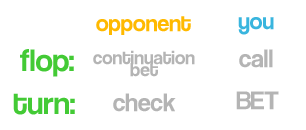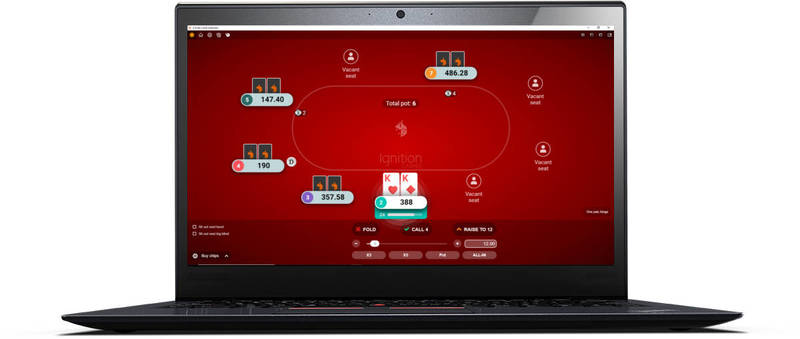The Float Play
Further Strategy: Tight Aggressive : Continuation Bet : Check Raising : Float Play : Stack Sizes : Relative Position

Continuation bets can get seriously annoying after a while. You know that they probably don't have a great hand, but you don't really want to risk raising when your hand isn't too great either, although it could well be the winner. So what do you do?
This is where the float play is going to come in and save the day for you.
What is the float play?
The float play is when you call an opponent's continuation bet on the flop with the intention of making a bet (or possibly a raise) on the turn to take down the pot.
So instead of trying to catch out your opponent on the flop by making a risky raise, you simply call the bet and wait for the turn to make your aggressive play to push your opponent off the hand.

If you're wondering where the word 'float' comes in to this, you are essentially 'floating' the flop (as opposed to 'sinking' by folding) so that you can make a bet on the turn to take the pot.
Why is the float play effective?
The float play is useful because it gives you more options when you are faced with a continuation bet. If you were unaware of the possibility to float your opponent, you would be confined to either taking the passive option of folding, or the overly aggressive option of raising, and neither of these plays seem to fit very well when you have a decent hand (but not one you want to go to war with).
The float play opens up another avenue for profitably playing a hand in Texas Hold'em.
How to use the float play.
 To run a successful float play, there are three conditions that ideally need to be met:
To run a successful float play, there are three conditions that ideally need to be met:
- You should be heads up with your opponent.
- You should have position over your opponent.
- You should have a hand that has potential to improve.
Floating heads up.
Being heads-up is vital to the success of the float play, as being in a multi-way pot will reduce the significance of your flop call and thus your bet on the turn will have far less impact. Furthermore, the presence of other players in the hand can really throw a spanner in the works if they come along for the ride, so make sure you are heads up when you are attempting to float your opponent. It just makes things easier.
Floating in position.
Although having position is not essential, I would highly recommend that you are acting after your opponent when using the float play. If you are acting after your opponent, you allow them to show their weakness on the turn by checking, allowing you to comfortably bet and put them to a tough decision.
However, if they are acting after you, you are not able to see them check or bet before you are able to make your decision on whether or not to bet and continue with the float play. So in a nutshell, being in position puts you in much better shape.
Floating out of position leaves you with little information on the turn, which is the focal betting round when using the play.
Floating with a hand that has potential.
You could try a float with any old hand, but it is definitely not recommended. Although the float play is pretty handy, you will from time to time come up against a player that is not continuation betting and actually holds a decent hand.
Therefore, I would recommend that you have a hand that has some potential to improve on the turn or river so that you are not completely stuck when the float doesn't work out exactly how you planned. It is always a good idea to leave yourself some outs rather than taking a shot in the dark.
The float overview.
The float play is not the magical sword to defeat the mighty continuation bet, but it is a decent weapon to have in your poker arsenal for the right situations. It is important to remember that just because you can use the float play, it doesn't mean you should. If the float is used sparingly and in the correct situations, it will be profitable.
However, if you abuse it and take advantage of it to try and "teach the continuation bettors a lesson", you will find yourself losing money.
Floating situations will make themselves apparent when you are in the right situation, so don't try and go looking for them!
Go back to the sublime Texas Hold'em guide.
Can You Afford Not To Use
Poker Tracker 4?
“I wouldn’t play another session of online poker without it”
“I play $25NL, and in under 1 week PT4 had paid for itself”
Comments

